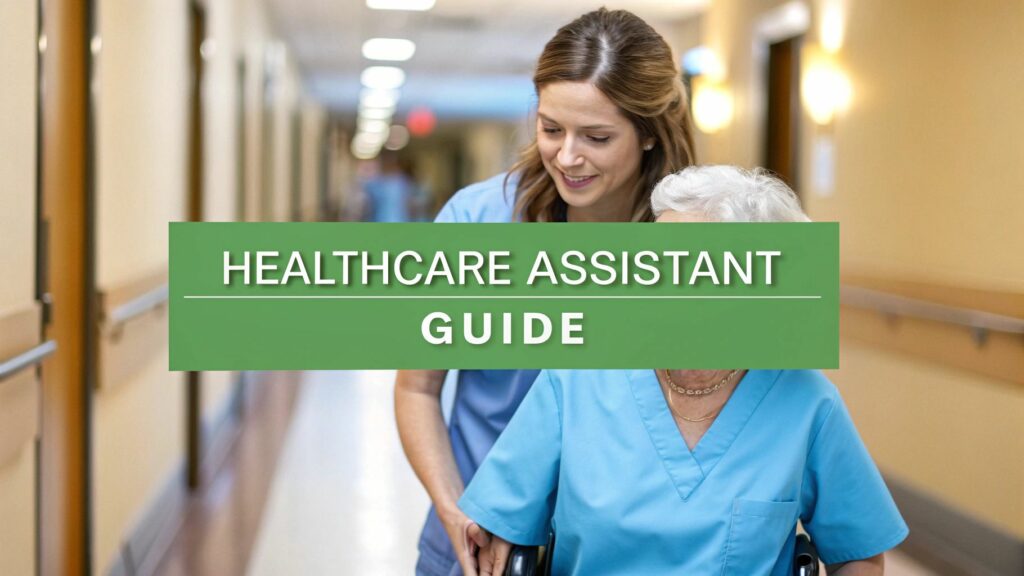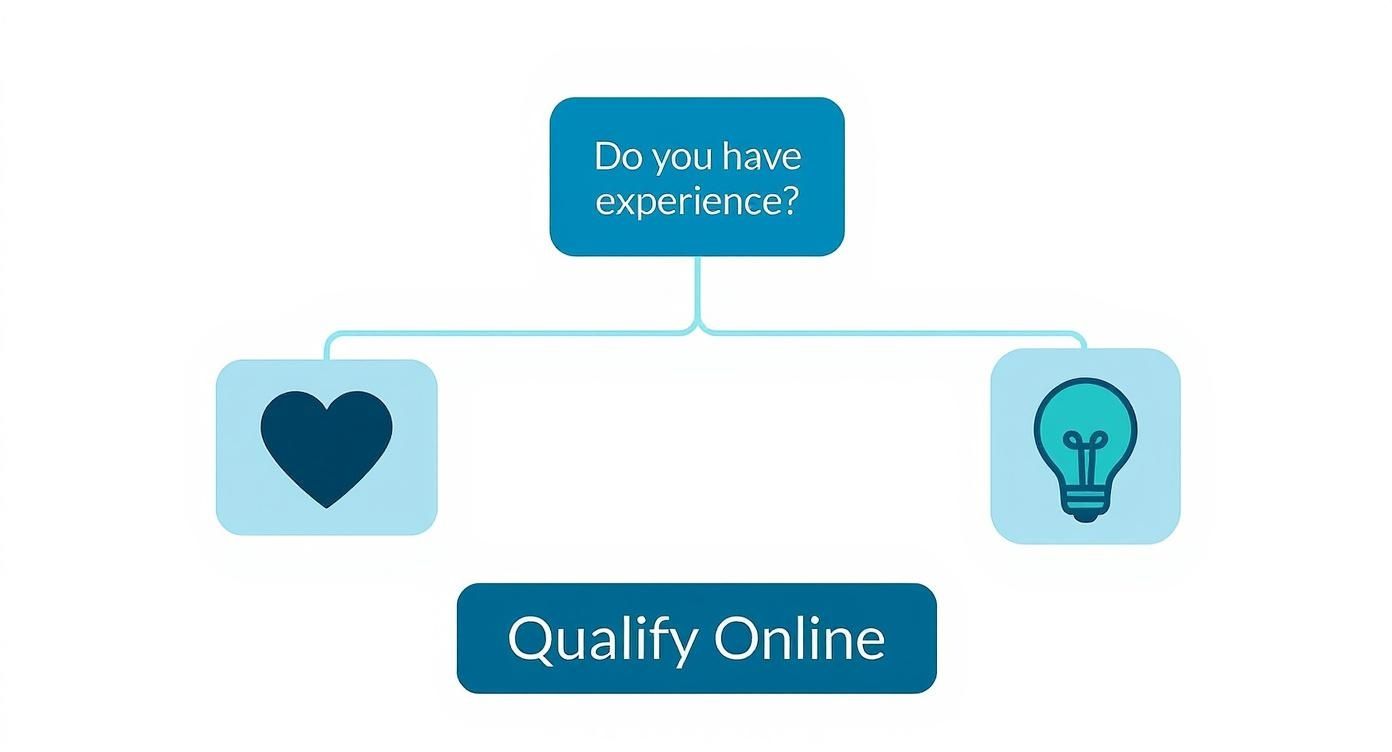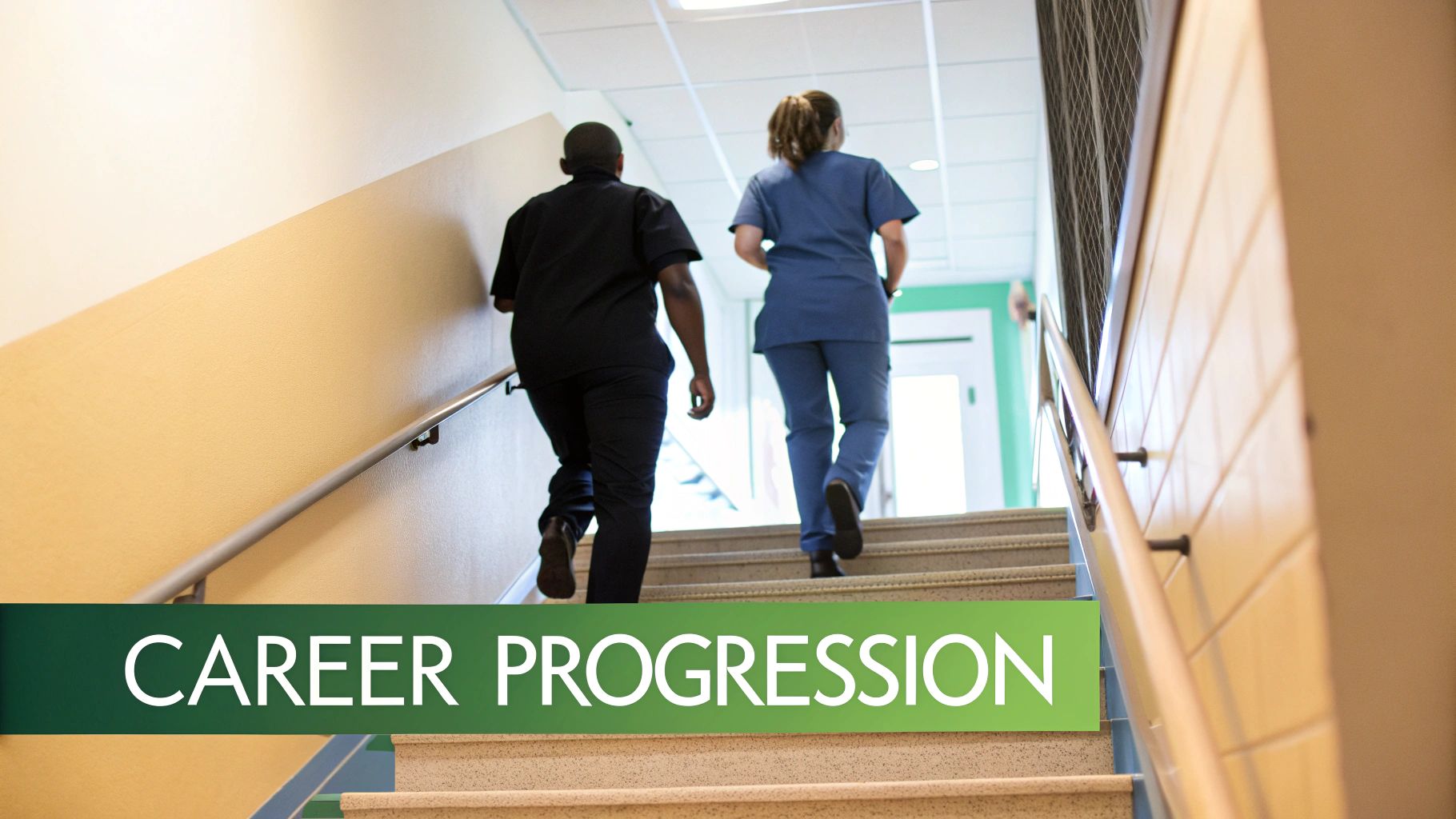
Are you wondering how to become a healthcare assistant? You might be surprised to learn the path is more accessible than you think. While many roles don't require formal qualifications upfront, completing a relevant health and social care course can significantly boost your hiring chances and give you the confidence to excel from day one.
This guide will walk you through everything you need to know, from the skills you'll need to the best routes into this rewarding career.
What is a Healthcare Assistant?
Choosing a career as a healthcare assistant (HCA) is an excellent move if you're a compassionate person with a genuine desire to make a difference. HCAs are the backbone of patient care, working in hospitals, clinics, and care homes across the UK. You'll provide essential, hands-on support that ensures patients are comfortable, safe, and treated with dignity.

The demand for dedicated HCAs is always growing, which means you're stepping into a stable and secure career with plenty of room to progress. Let's dive into what the job involves and how you can get started.
What Does the Role Involve?
The day-to-day life of a healthcare assistant is incredibly varied, but it always puts the patient first. Working under the supervision of nurses and other medical professionals, you'll help with the crucial duties that keep a healthcare setting running smoothly.
Your responsibilities could include:
-
Helping patients with personal care, like washing, dressing, and eating.
-
Taking and recording vital signs, such as blood pressure, temperature, and pulse.
-
Making beds and keeping the patient's area clean, tidy, and safe.
-
Listening to patients' worries and offering emotional support and reassurance.
-
Assisting with patient mobility, which might involve helping them move around safely.
At its core, your role is a vital link between the patient and the nursing team. This foundational experience is invaluable, and if you want to understand the bigger picture, it's worth exploring how to get into health and social care.
While technical skills can be taught on the job, the heart of the HCA role is human connection. Your ability to show empathy, communicate clearly, and stay calm under pressure is what will make you brilliant at what you do.
To get you started, here’s a quick summary of what you need to know about the HCA journey.
Healthcare Assistant Career Snapshot
| Aspect | Key Details |
|---|---|
| Entry Requirements | Often no formal qualifications needed to start, but GCSEs in English and Maths are beneficial. |
| Key Qualifications | The Care Certificate is highly valued. A Level 2 or 3 Diploma in Health and Social Care can boost your prospects. |
| Essential Skills | Compassion, patience, excellent communication, teamwork, and the ability to remain calm under pressure. |
| Work Settings | NHS hospitals, private clinics, GP surgeries, care homes, and community healthcare settings. |
| Career Progression | Can lead to senior HCA roles, nursing associate positions, or provide a pathway to nursing degrees. |
While many people start their HCA career without formal qualifications, employers increasingly look for candidates with recognised certifications. The Care Certificate, for example, proves you have a solid grasp of care standards and helps your CV stand out. Taking that extra step to get qualified is a smart move for your future.
The Essential Skills Every HCA Needs
While qualifications open the door, it’s your personal qualities that will make you shine as a healthcare assistant. This role is deeply people-focused, meaning success is measured not just by what you know, but by who you are. Employers are always looking for individuals who bring a blend of compassion and professionalism.
Think of it this way: technical skills can be taught, but a genuine sense of empathy is something you bring with you. It’s the ability to sit with an anxious patient, offer a reassuring word, and make them feel truly seen. These are the soft skills that form the foundation of outstanding patient care.
The Core Qualities of a Great HCA
Beyond the clinical side, several key traits are non-negotiable for anyone looking to become a healthcare assistant. You'll rely on these skills every single day.
Here are the essentials:
-
Compassion and Empathy: This is the heart of the role. It’s about putting yourself in a patient's shoes to provide care that is not only effective but also kind and dignified.
-
Patience and a Calm Demeanour: Healthcare settings can be stressful. Your ability to stay calm, especially when a patient is distressed, is invaluable for keeping everyone safe and supported.
-
Excellent Communication Skills: You’ll often be the bridge between patients, their families, and the wider medical team. This means you need to be a great listener and able to explain things clearly, without jargon.
These qualities build trust, which is the cornerstone of any effective patient-carer relationship. When patients trust you, they feel more comfortable and are more likely to cooperate with their care plan.
Putting Skills into Practice
It's one thing to say you have these skills, but another to show them. Picture this: you're helping an elderly patient who is confused and refusing to eat. Your patience allows you to take your time. Your empathy helps you understand the fear behind their refusal. And your communication skills let you gently encourage them in a supportive, not forceful, way.
Developing strong professional skills is also vital. This includes understanding team dynamics and effectively navigating workplace relationships with colleagues in a demanding environment.
Key Takeaway: Don’t underestimate the experience you already have! Skills from retail, hospitality, or any customer-facing job are highly relevant. You’ve already developed communication, problem-solving, and teamwork abilities – be sure to highlight them in your application.
Showcasing Your Skills to Employers
When you're applying for HCA roles, you need to make these qualities jump off the page. Don't just list them on your CV; back them up with real-world examples.
Here’s how you can translate your abilities into compelling points for your application:
| Skill You Have | How to Frame It on Your CV or in an Interview |
|---|---|
| Teamwork | "Collaborated with a team of five in a fast-paced retail environment to consistently meet sales targets and manage stock levels." |
| Communication | "Regularly handled customer queries and complaints, resolving issues calmly and ensuring a positive customer experience." |
| Resilience | "Successfully managed multiple competing priorities during peak hours while maintaining a high standard of service." |
By framing your experience this way, you show potential employers that you already have the foundational skills to excel as a healthcare assistant. You're proving it with real evidence, which makes your application truly powerful.
Finding Your Pathway into a Healthcare Role
Deciding you want to become a healthcare assistant is the exciting first step. The next is figuring out the best way to get there. Thankfully, there are several routes into this career, and the right one for you will depend on your experience and goals.
You don’t always need a background in care to start. Many successful HCAs come from different sectors, bringing a wealth of transferable skills. The key is to find a pathway that builds your confidence and gives you the knowledge employers are looking for.
Direct Applications to Employers
One of the most common routes is applying directly for HCA positions. NHS trusts, private hospitals, and care homes frequently advertise entry-level vacancies. This path is ideal if you feel ready to jump straight into a hands-on role. However, competition can be fierce, which is where having a relevant qualification can make all the difference.
The Apprenticeship Route
An apprenticeship combines paid, on-the-job training with formal study. It’s a fantastic option if you prefer a guided learning experience and want to earn while you learn. They typically last between 12 and 24 months and lead to a Level 2 or 3 Diploma in Health and Social Care.
Gaining an Edge with a Foundational Course
For many aspiring HCAs, the smartest move is to complete a foundational course before applying for jobs. This proactive approach shows employers you're serious about a career in care and have already invested in your development.
A dedicated Health and Social Care course gives you the essential theory and understanding of best practices that employers value. It covers critical topics like safeguarding, person-centred care, and health and safety, giving you a significant leg-up on other candidates.
By completing a course first, you're not just applying for a job; you're presenting yourself as a knowledgeable and committed candidate who is ready to contribute from day one.
This decision tree can help you visualise which path might suit you best.

As the infographic suggests, whether you're new to the field or have prior experience, gaining a formal qualification online is a powerful step towards securing your role.
Why Formal Training Matters More Than Ever
The healthcare landscape is evolving, and so are employer expectations. While HCAs were once trained entirely on the job, there's now a stronger emphasis on having foundational knowledge before you start.
Here’s why a qualification is so beneficial:
-
It Builds Confidence: You’ll start your first day with a solid understanding of care principles, which helps you adapt more quickly.
-
It Demonstrates Commitment: Investing in a course proves to employers that you are dedicated to providing high-quality care.
-
It Expands Your Options: A qualification can make you eligible for a wider range of roles, including those in more specialised settings.
The demand for skilled care workers is undeniable. Healthcare assistants are among the most sought-after roles in the UK, a trend driven by an ageing population. For more insights, you can read about the UK job market for healthcare workers at The Workers Union.
Choosing to get qualified first sets you up for success. At Stonebridge Associated Colleges, our flexible health and social care courses are designed to fit around your life. With our subscription model, you can gain an accredited qualification without large upfront fees or long-term credit agreements. It’s an affordable, convenient way to build a career you can be proud of.
Why an Online Course Is Your Smartest First Step
Juggling work, family, and life is tough. Squeezing in full-time study can feel impossible. This is why flexible online learning has become a game-changer for anyone figuring out how to become a healthcare assistant.
An online course puts you in the driver's seat, letting you earn essential qualifications around your life, not the other way around. It’s a practical solution built for the realities of modern life.

This approach removes hurdles like commuting or being tied to a fixed timetable. You can study from home after the kids are in bed or during your lunch break. It's education that fits you.
Embrace Learning That Fits Your Life
Here at Stonebridge Associated Colleges, we’ve designed our health and social care courses to be online for this very reason. We know our learners are often busy professionals or parents who can't put their lives on pause.
Our unique take on this is a flexible subscription model. Instead of hefty upfront fees or long-term loan agreements, you pay a simple, manageable monthly fee.
This model gives you total control:
-
No big financial commitment: Get started without a massive initial investment.
-
Complete flexibility: Life gets busy? No problem. You can pause your subscription anytime.
-
No long-term contracts: If your circumstances change, you have the freedom to cancel.
It’s a low-risk pathway that lets you focus on gaining the skills that will land you a rewarding role as a healthcare assistant.
Quality Education and Support Guaranteed
Choosing an online course doesn't mean you're going it alone. At Stonebridge, we back our flexible learning with robust support and accredited qualifications that employers respect. With over twenty years of experience, we've refined our programmes to deliver real career outcomes.
When you enrol, you get access to a wealth of resources and qualified tutors for personalised guidance. They’re here to answer your questions, give feedback, and cheer you on every step of the way.
Our subscription-based learning removes financial stress and scheduling conflicts, empowering you to gain accredited qualifications that make a real difference to your career prospects.
Our courses, from Access to Higher Education Diplomas to specialised health and social care programmes, are broken down into easy-to-digest modules. This lets you learn at a pace that feels comfortable. It’s a smart, cost-effective way to build the credentials you need.
The Smart Way to Get Ahead
So, why is an online course the smartest first step? Because it directly tackles the two biggest worries for adult learners: time and money. By choosing a flexible, subscription-based provider like Stonebridge, you're investing in your future without sacrificing your present.
Just look at how this modern approach stacks up:
| Traditional College | Stonebridge Online Subscription |
|---|---|
| Rigid Timetables | Study anytime, anywhere |
| Large Upfront Fees | Affordable monthly payments |
| Commuting Required | Learn from the comfort of home |
| Fixed-Term Enrolment | Pause or cancel when you need to |
You end up with the same valuable, accredited qualifications but with a level of convenience and financial freedom that traditional education can't match. This is a massive advantage, especially if you're considering an Access course. To learn more, explore why studying an Access to Healthcare course is such a powerful move.
How to Craft an Application That Gets Noticed
Ready to start applying for healthcare assistant jobs? Fantastic. A strong application is your chance to tell a hiring manager why you have the skills, compassion, and professionalism to be brilliant in a care setting.
Even if you’ve never worked in healthcare before, you can still shine. The trick is to highlight your transferable skills in a way that speaks directly to the needs of a busy healthcare environment.
Tailoring Your CV to the Role
Think of your CV as your professional highlight reel. Instead of sending the same generic version to everyone, customise it for each specific HCA role. Read the job description carefully, picking out keywords and weaving them into your CV.
No direct care experience? That’s fine. Just reframe your previous jobs to showcase the abilities that matter.
-
Retail or Hospitality: Talk about handling tricky customer queries and being a reliable team player.
-
Office Administration: Focus on your organisational skills and ability to handle confidential information.
-
Call Centre Work: Highlight your top-notch communication skills and patience.
Making these connections shows employers you already have the core qualities of a great HCA. For more tips, check out our guide on how to make your job application stand out.
Writing a Cover Letter That Connects
Your cover letter is your chance to show your personality and passion. Go beyond bullet points and explain why you’re drawn to a career as a healthcare assistant. Share what drives you to help people and link it to the values of the hospital or care home you're applying to.
Pro Tip: A brief, relevant story can make a huge impact. Perhaps you cared for a family member, or a specific customer service interaction sparked your interest. That personal touch makes you memorable.
Keep it sharp, professional, and focused on what you can bring to the team.
Preparing to Ace the Interview
Getting an interview invitation is a big win! Now it’s about preparation. Employers are looking for genuine empathy, a positive attitude, and a great team fit.
Get ready to answer common questions with specific examples. The STAR method (Situation, Task, Action, Result) is a brilliant way to structure your answers.
-
"Why do you want to be a healthcare assistant?" Make it personal. Connect your answer to a genuine desire to care for and support others.
-
"Tell me about a time you dealt with a difficult person." Use a real example from a previous job to demonstrate your patience and problem-solving skills.
-
"How do you handle stress?" Describe the practical strategies you use to stay calm and focused.
Always research the specific hospital, clinic, or care home. Understanding their mission shows you’re genuinely interested in this job. Come prepared with a couple of thoughtful questions of your own to show you're engaged.
Mapping Your Career Growth Beyond an HCA Role
Becoming a healthcare assistant is the start of a meaningful, long-term career. It's a foundation you can build on, opening up a future of specialisation and advancement. This role gives you incredible first-hand experience, helping you figure out which areas of healthcare spark your passion.

From this starting point, the opportunities are vast. You might discover a knack for working with children, which could lead towards paediatrics. Or perhaps your calm nature makes you a perfect fit for a role in mental health support.
Advancing Within the HCA Role
Your first move could be to a senior healthcare assistant or assistant practitioner position. These roles come with more responsibility, like mentoring new HCAs and taking a more active role in planning patient care. This is a fantastic way to deepen your expertise without committing to a full university degree right away.
The experience you gain as an HCA is your most valuable asset. It provides a real-world understanding of patient needs that you can't learn from a textbook.
Healthcare assistants are vital for delivering frontline care, especially within a system as huge as NHS England. With ongoing staff shortages in nursing, the responsibilities for assistants have expanded, creating a stable job market where HCAs are the backbone of patient support. You can learn more about the UK's health system personnel to see just how big the opportunity is.
A Stepping Stone to Nursing and Midwifery
Many people use their HCA experience as a pathway to becoming a registered nurse or midwife. The skills you pick up on the job make you an incredibly strong candidate for higher education courses.
This is where a qualification like an Access to Higher Education Diploma becomes so valuable. These diplomas are designed for adult learners who might not have traditional A-levels.
At Stonebridge, our online Access to HE Diplomas in areas like Nursing and Midwifery are built to bridge that gap. The subscription model makes it affordable and flexible, letting you study around your HCA shifts. You’ll earn a recognised qualification that opens the door to a university degree and the next chapter of your career.
Your HCA Questions Answered
Stepping into a new career always brings up questions. Here are quick answers to some of the most common queries about becoming a healthcare assistant.
Do I Really Need GCSEs to Get Started?
Not always. While many employers like to see GCSEs in English and Maths, plenty of HCA roles are open to people without them. A relevant qualification like a Health and Social Care course can often be more valuable than old school results, especially if you can show you have great practical skills.
What’s the Biggest Difference Between the NHS and Private Care?
The day-to-day environment and pace are the biggest things you'll notice. Working in the NHS usually means being in a bustling hospital where you’ll see a massive range of acute health conditions. Private care homes often focus on long-term residential and palliative care, giving you the chance to build deeper relationships with the people you look after.
Can I Become an HCA with No Experience?
Absolutely! This is one of the most welcoming entry points into healthcare. Employers value life experience and transferable skills—like communication, empathy, and teamwork. More than anything, it’s your passion for helping people that will make you stand out.
Ready to build the skills that employers are looking for? Stonebridge Associated Colleges offers flexible, 100% online Health and Social Care courses designed to fit around your life. With our affordable subscription model, you can get started on your future today.
Find the right course for you at Stonebridge Associated Colleges.




